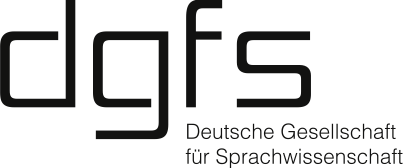AG 2: Exact repetition in grammar and discourse
AG-Koordination
Rita Finkbeiner (U Mainz) & Ulrike Freywald (U Potsdam)
Abstract
Most linguists will agree that iteration is a pervasive phenomenon in language and an important notion for linguistic analysis. Traditionally, the process of repetition is related to the domains of text and discourse, and associated with specific pragmatic effects (e.g., emphasis), while the process of reduplication is restricted to the domains of phonology and morphology, and associated with specific semantic effects (e.g., intensification). In phonological and syntactic theory, reduplication has mainly been discussed as a local copying process, while in typology, it has been described as a morphological marker of inflection or word formation. Repetition phenomena, in contrast, have been claimed to apply above word level. In interactional linguistics, the focus has been on functions of repetition such as marking of agreement and disagreement.
In recent years, however, one has come to realize that the borderline between reduplication and repetition is rather fuzzy (Stolz et al. 2011). For example, in contrastive focus reduplication (e.g. salad-salad ‘prototypical salad’), it is not quite clear whether we have to do with a “grammatical” or rather a “pragmatic” process. Moreover, while most European languages traditionally have been regarded as lacking reduplication altogether, there is now evidence that there are niches of productive (total) reduplication also in alleged “reduplication avoiders” such as German (Finkbeiner 2014, Freywald (in prep.)).
The workshop aims at bringing together linguists interested in the phenomenon of exact repetition, understood broadly as the complete iteration of items on all levels of linguistic description, including phonology, lexicon, syntax, text, and discourse. Special attention will be paid to languages traditionally regarded as reduplication avoiders as well as to the borderline between reduplication and repetition. Studies on the acquisition and change of exact repetition are very welcome, as are descriptive studies of exact repetition in various languages, registers and genres.
References
- Finkbeiner, R. (2014): The grammar and pragmatics of N hin, N her (‘N thither, N hither’) in German. To appear in: Pragmatics & Society 5.2.
- Freywald, U. (in prep.): Total reduplication in German. To appear in: Studies in Language.
- Stolz, T. et al. (2011): Total Reduplication. The Areal Linguistics of a Potential Universal. Berlin: Akademie.
Programm
| 4.3.2015 | |||
| 14:00 | Rita Finkbeiner (U Mainz) & Ulrike Freywald (U Potsdam) | ||
| Introduction | |||
| 14:30 | Thomas Stolz (U Bremen) | ||
| On telling repetition and reduplication apart. A set of guidelines | |||
| 15:30 | Vadim Kimmelman (U Amsterdam) | ||
| Repetition, reduplication, and doubling in Russian Sign Language | |||
| 16:00 | Pause | ||
| 16:30 | Thomas Schwaiger (U Graz) | ||
| The derivational nature of reduplication and its relation to boundary phenomena | |||
| 17:00 | Anke Lensch (U Mainz) | ||
| A quick fixer-upper of English word-formation-reduplication in derivation | |||
| 17:30 | Christoph Petermann (DIJ Tokyo/FU Berlin) | ||
| A corpus-based study on total reduplication in Modern Japanese | |||
| 18:00 | Yanyan Sui (Nánkāi U) | ||
| Reduplication in Standard Chinese | |||
| 5.3.2015 | |||
| 9:00 | Laurence R. Horn (Yale) | ||
| The lexical clone: pragmatics, prototypes, and productivity | |||
| 10:00 | Chris Cummins (U of Edinburgh) | ||
| Repetition versus implicatures and presuppositions | |||
| 10:30 | Sonja Gipper (U Köln) | ||
| Repetition and language change: Repeating responses in conversation as amplifiers of linguistic innovations | |||
| 11:00 | Pause | ||
| 11:30 | Mary Jill Brody (Louisiana State U) | ||
| Exact repetition in Tojolab’al Maya | |||
| 12:00 | Daniela Rossi (U Libre de Bruxelles) | ||
| Creative uses of reduplication as legitimate instances of total reduplication: arguments from French | |||
| 12:30 | Kathleen Schumann & Heike Wiese (U Potsdam) | ||
| Exact repetition: the case of focus marking so and other German particles | |||
| 6.3.2015 | |||
| 11:30 | Rita Finkbeiner (U Mainz | ||
| Exact repetition in syntactic constructions: A pragmatic view | |||
| 12:00 | Kaitlin Cannava (Louisiana State U) | ||
| The many forms of repetition: an analysis of ways to measure verbal mimicry | |||
| 12:30 | Matthias Eitelmann & Britta Mondorf (U Mainz) | ||
| The role of cognate objects in language variation and change | |||
| 13:00 | Betül Erbaşı (Boğaziçi U, İstanbul) | ||
| Turkish doubled verbs as doubled TPs |
Abweichung vom ursprünglichen Plan
Der Vortrag von Kentner ist entfallen.

